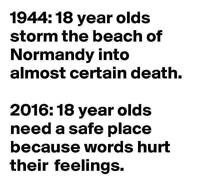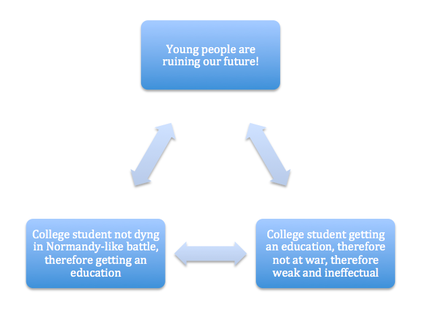I've noticed that even when people are called out for endorsing fiction, they refuse to admit they are wrong. With the advent of social media and biased blogs and "opinion news," we can easily build ourselves into a bubble of information that only further affirms our worldviews.
Here's my take on several things that are driving the way we think and communicate with each other, for better or for worse...
Social media: In 2006, Facebook only had 12 million monthly users, and it was only 2 years old; the concept of social media was still being molded. No Instagram or Snapchat yet -- no iPhones yet, either. No #blacklivesmatter and #bluelivesmatter and #alllivesmatter duking it out over Twitter. Our main source of news was still the paper and television. Today, Facebook has 1.23 billion monthly users. Think of your last family reunion; have you ever made it through without someone butting heads with someone, or someone feeling annoyed at the brush of a shoulder or getting snubbed in ways inscrutable to the snubber, or Aunty Betty saying something off color, or a circle of cousins interjecting while Uncle Jack inaccurately tells a story? Now amplify that daily by the millions or monthly by the billions. Amplify that on every possible social media platform out there. Amplify that with every questionable news site that has sprouted up like poison ivy, and every meme that spouts unchecked facts and has a 500-thread argument between strangers raging beneath it. Social media is still a way we share pictures and good stories and positive messages, but it is also now a place where we exchange news (credible or not) and opinion, especially on issues we care deeply about.
Do you think this might make everyone a little tense? Do you think it might cause people to feel existential angst? Insecure about who they are and what they believe, so that when others contradict it, they become inflamed and offended, and they quickly surf their favorite news source to find an article that reaffirms their worldview?
Conversation has become physically easier but theoretically more difficult.
The advent of the smartphone: The first generation iPhone came out in 2007. Today, nearly 68% of American adults have smartphones, which means the majority of us has access to video cameras, partnered with the ability to instantly publish any footage -- from our cell phones or surveillance videos, etc -- on youtube, blogs, and social media. The white-dominated media used to edit clips and frame each story to make sense of it for its majority audiences, but today, the average person has access to raw materials and thousands of different ways to frame each story. In return, people have learned to shop for their favorite interpretation.
Take a look at how the mass public handled the stories of Eric Garner. John Crawford. Tamir Rice. Terence Crutcher. Do you think that type of injustice wasn't happening before? If so, what a magical unicorn cloud you must have been living on. Those who don't want to admit there is a problem grasp for a satisfactory way to make sense of it all. Suddenly, clear evidence is up for debate; we are a jury of 242 million. People find a news sources that frame things to their liking, or they come up with stories like It wasn't this bad before we had a black president or This is just Liberal America fanning the flames. But it's right there in front of us, a tragedy playing on loop but each time with a different victim. I’ve heard people point to "black on black crime” as if this is some context that makes police brutality and poor police training excusable; as if being the same color makes murder less tragic; as if civilian violence is the same problem as a police officer abusing power; as if it insults them that we now must talk about this.
In summary, there is a dueling nature to having such access to the raw story: while it is good to have more "frames" to our news stories, it can also be dangerous when news sites are not reporting the full story in order to perpetuate a comforting narrative for its audiences.
What's more, with smartphones it has not only become easier to access evidence, but it is also easier to share our opinions almost as quickly as they pop in our heads. This means spreading information quickly without necessarily thinking deeply about it.
The addition of more news sources is a good and bad thing. The big news media is notorious for creating panic, slanting its reporting to influence policy or agenda, and so on. It's good that there is more competition now. But it's truly a negative thing that so much of the competition has become unchecked. So much of what I have investigated, from BreitBart to Jezebel, is simply atrocious journalism.
Controversy for profit: Let's not forget that our news industry, which is ever-growing and increasingly more competitive in the Internet age, thrives on controversy. When we are angry and afraid and at each other's throats, the bait is ripe for the clicking. Isn't that evident already? So when the shooting of an unarmed black man is straightforwardly unethical and devastating, it is better for those profiting if we argue about it.
Humans are stubborn in their arguments. When we feel we are being attacked, we are unwilling to hear our attacker's point of view. That is why, currently, an "attack" narrative is fueling our discourse, if you could call it that.
Today there is a lot of dysfunctional dialogue, but there is also meaningful momentum. On a more positive note, these changes have also allowed (1) a platform for a multitude of voices that can speak to what is life in America, and those uncensored voices can be amplified when they are determined; (2) the ability to produce evidence of injustice, lay it out for all to see, so that there is no logical denial of what happened to Tamir Rice and Terence Crutcher, and we can demand accountability or changes in procedure and policy where it once was overlooked; (3) a more competitive news world to challenge our former framing and one-sided narratives -- a sea of information that can push our country forward if we figure out how to use it better.
But that's the key: we must figure out how to use it better. In the name of a better, more informed society, I ask that you challenge yourself more. Read opinion pieces that challenge your worldview, and not for the sake of posting an angry comment in response. Read balanced, nonpartisan studies about evidence-based practices that will contribute to a better world (ALWAYS question who is funding each study, what the objectives might be, and whether it was a reliable method of collecting data). Stay off of Facebook for your news. If you find that something you are reading is making you angry, ask yourself why -- is it because you feel challenged, that the truth is difficult to hear, or that it is not factual (if so, check those facts!)? Steer clear of opinion pieces regarding policy, and read straight-forward articles about what is going on in the world. Push yourself to think for yourself. Get into arguments for the sake of understanding others and with the hope that others are willing to try to understand you. Let's stop the foolish commotion that has overtaken us in this information age, everybody.
My long-winded argument aside, it's not a bad idea to take a moment to root for love. Play a game of cards with your family, go somewhere you can dance to loud music that drowns out the politics; sing with your mother in the car and ask your cousins about their health and happiness. Go on living out and internally checking your convictions despite many people who might loathe them. Remember that all humans suffer from myopia and egocentrism, including me, myself, and I. Learn that you can be friends with someone who contradicts so much of who you are or aspire to be, yet still makes you laugh and see beautiful things in the world. Appreciate that there is more to being human than being right.


 RSS Feed
RSS Feed